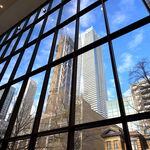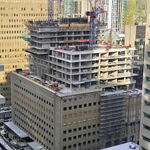nfitz
Superstar
Their official website consistently calls it Light Rail. https://rem.info/enNot because its LRT but because of careless. The "industry" journalists were probably reading the same badly translated press releases.
Even at peak they are only scheduling trains every 10 minutes for the Dorval and West Island branches. That's 3,600 passengers an hour. No where near heavy rail territory. Ultimate capacity is 10 trains an hour. 7,200 passengers an hour for both Dorval and West Island. Still light rail capacity.
They officially call it LRT. It's on the low end of LRT capacity for 2 of the 3 branches.
And that's for the REM lines with the longer trains. For the new east-west line with the 40-metre trains, assuming they use the same vehicles, Ultimate capacity is 300 passengers per train with 20 trains an hour. That's 6,000 passengers an hour.
If they use the narrow vehicles like they use on most of the Skytrain lines in Vancouver, then that's 175 passengers per train and an ultimate capacity of 3,500 passengers per hour.
Last edited:




